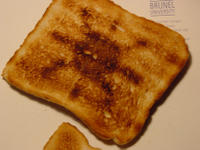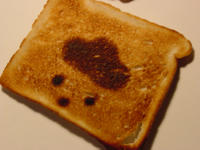When you gave me the word "toast" for a story suggestion, I thought I would have no end of ideas. The scent of my Indiana grandparents' house was that of hot, buttered-toast, and while it's a common enough scent, it rarely fails to make my eyes sting with longing and yearning (or as the Germans say, "Sehnsucht.") When Bede first called me from Seattle while I was living in New York, I wrote in my journal that his voice reminded me of buttered-toast. Why? This passage from Kenneth Grahame's A Wind in the Willows might reveal a clue:
"When the girl returned, some hours later, she carried a tray, with a cup of fragrant tea steaming on it; and a plate piled up with very hot buttered toast, cut thick, very brown on both sides, with the butter running through the holes in it in great golden drops, like honey from the honeycomb. The smell of that buttered toast simply talked to Toad, and with no uncertain voice; talked of warm kitchens, of breakfasts on bright frosty mornings, of cosy parlour firesides on winter evenings, when one's ramble was over and slippered feet were propped on the fender, of the purring of contented cats, and the twitter of sleepy canaries."
It is this passage about toast that superimposes itself upon my story-drafts. While Nigel Molesworth scoffs at The Wind in the Willows, I'm inclined to think he never read beyond the langorous pastoral settings to discover the food descriptions. In the chapter where the Water Rat meets a Sea-Faring Rat, and brings out a picnic lunch,
"[The Water Rat] packed a simple meal, in which, remembering the stranger's origin and preferences, he took care to include a yard of long French bread, a sausage out of which the garlic sang, some cheese which lay down and cried, and a long-necked straw-covered flask wherein lay bottled sunshine shed and garnered on far Southern slopes. Thus laden, he returned with all speed, and blushed for pleasure at the old seaman's commendations of his taste and judgment, as together they unpacked the basket and laid out the contents on the grass by the roadside."
On second thought, perhaps I understand why Nigel Molesworth couldn't stand The Wind in the Willows. How could he torture himself by reading about scrumptious picnic lunches when he had to face the dining hall of St. Custards?

 P.S. I happened across an article about a toaster that reveals the weather forcast. This item is more in line with Bede's blog than here, as it enters the realm of things "stranger than (science) fiction."
P.S. I happened across an article about a toaster that reveals the weather forcast. This item is more in line with Bede's blog than here, as it enters the realm of things "stranger than (science) fiction."






3 comments:
weather forecasts on your toast? that's great! :)
speaking of books with warm, fuzzy food descriptions reminds me of the frances books by lillian hoban. i specifically remember two
first: where frances took a picnic in a "hamper" that included yummy sandwiches and i don't know what all else, but i always had a mental image of frances hauling something like our clothes hamper and drooled over how large her picnic must be to require such a large container. i believe this was from best friends for frances.
second: at the end of bread and jam for frances she describes the lunch she packs for school. it includes many things, but i have fond memories of her description of a hard boiled egg with a little cardboard salt shaker and a tiny vase of violets. i mean, how cool would it be to actually have a vase of flowers packed in with your lunch?!
Oh, YES! I well remember the food descriptions from Bread and Jam for Frances! I don't think there is a better book for food descriptions anywhere! On second thought, every time in my life since young childhood that I have drank the sugar-milk from the bottom of a bol of cereal, I have thought of the "bowlsful of sweet goat's milk" in Heidi.
Yes, yes to Frances and Heidi! And don't forget Charlotte's Web-- E.B. White makes scraps from the pig trough sound absolutely delectable.
It occurs to me that both you might enjoy Jaqueline Jackson's book Turn Not Pale, Beloved Snail. It is a book about children and creative writing, but it's as much a celebration of children's literature. I had given up on Wind in the Willows until I read passages from Jackson's book.
Post a Comment